2016 NISSAN 370Z COUPE brake light
[x] Cancel search: brake lightPage 353 of 428
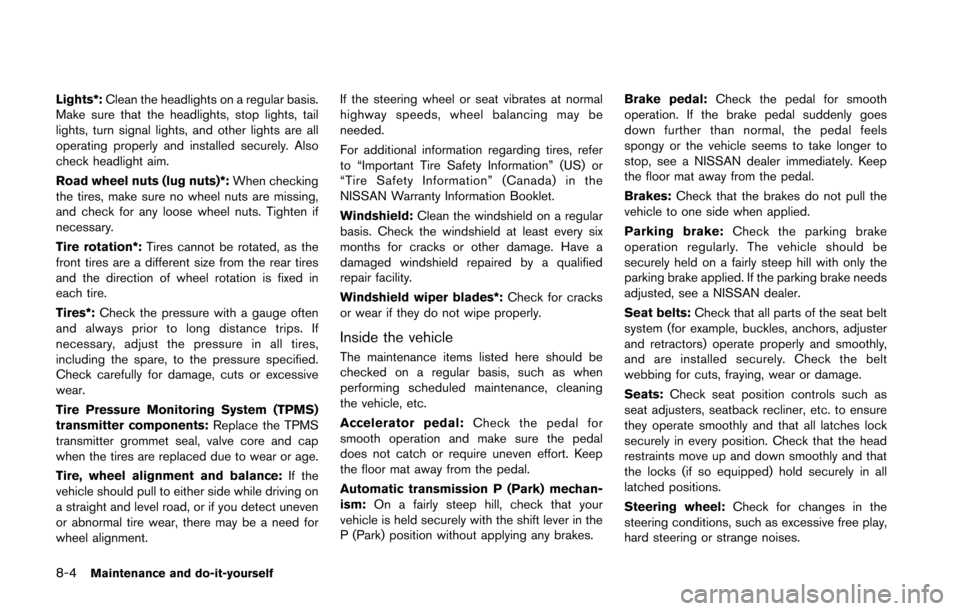
8-4Maintenance and do-it-yourself
Lights*:Clean the headlights on a regular basis.
Make sure that the headlights, stop lights, tail
lights, turn signal lights, and other lights are all
operating properly and installed securely. Also
check headlight aim.
Road wheel nuts (lug nuts)*: When checking
the tires, make sure no wheel nuts are missing,
and check for any loose wheel nuts. Tighten if
necessary.
Tire rotation*: Tires cannot be rotated, as the
front tires are a different size from the rear tires
and the direction of wheel rotation is fixed in
each tire.
Tires*: Check the pressure with a gauge often
and always prior to long distance trips. If
necessary, adjust the pressure in all tires,
including the spare, to the pressure specified.
Check carefully for damage, cuts or excessive
wear.
Tire Pressure Monitoring System (TPMS)
transmitter components: Replace the TPMS
transmitter grommet seal, valve core and cap
when the tires are replaced due to wear or age.
Tire, wheel alignment and balance: If the
vehicle should pull to either side while driving on
a straight and level road, or if you detect uneven
or abnormal tire wear, there may be a need for
wheel alignment. If the steering wheel or seat vibrates at normal
highway speeds, wheel balancing may be
needed.
For additional information regarding tires, refer
to “Important Tire Safety Information” (US) or
“Tire Safety Information” (Canada) in the
NISSAN Warranty Information Booklet.
Windshield:
Clean the windshield on a regular
basis. Check the windshield at least every six
months for cracks or other damage. Have a
damaged windshield repaired by a qualified
repair facility.
Windshield wiper blades*: Check for cracks
or wear if they do not wipe properly.
Inside the vehicle
The maintenance items listed here should be
checked on a regular basis, such as when
performing scheduled maintenance, cleaning
the vehicle, etc.
Accelerator pedal: Check the pedal for
smooth operation and make sure the pedal
does not catch or require uneven effort. Keep
the floor mat away from the pedal.
Automatic transmission P (Park) mechan-
ism: On a fairly steep hill, check that your
vehicle is held securely with the shift lever in the
P (Park) position without applying any brakes. Brake pedal:
Check the pedal for smooth
operation. If the brake pedal suddenly goes
down further than normal, the pedal feels
spongy or the vehicle seems to take longer to
stop, see a NISSAN dealer immediately. Keep
the floor mat away from the pedal.
Brakes: Check that the brakes do not pull the
vehicle to one side when applied.
Parking brake: Check the parking brake
operation regularly. The vehicle should be
securely held on a fairly steep hill with only the
parking brake applied. If the parking brake needs
adjusted, see a NISSAN dealer.
Seat belts: Check that all parts of the seat belt
system (for example, buckles, anchors, adjuster
and retractors) operate properly and smoothly,
and are installed securely. Check the belt
webbing for cuts, fraying, wear or damage.
Seats: Check seat position controls such as
seat adjusters, seatback recliner, etc. to ensure
they operate smoothly and that all latches lock
securely in every position. Check that the head
restraints move up and down smoothly and that
the locks (if so equipped) hold securely in all
latched positions.
Steering wheel: Check for changes in the
steering conditions, such as excessive free play,
hard steering or strange noises.
Page 354 of 428
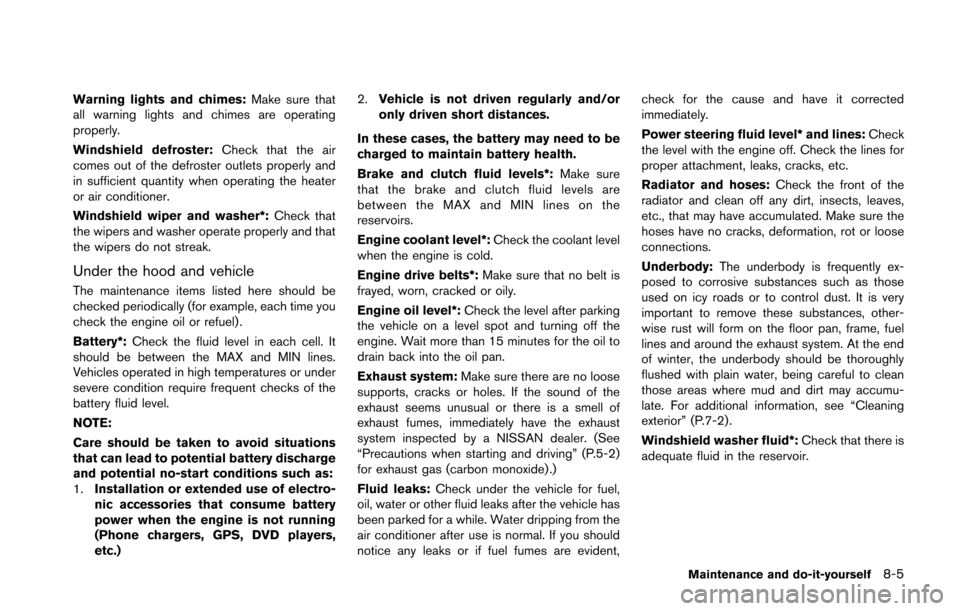
Warning lights and chimes:Make sure that
all warning lights and chimes are operating
properly.
Windshield defroster: Check that the air
comes out of the defroster outlets properly and
in sufficient quantity when operating the heater
or air conditioner.
Windshield wiper and washer*: Check that
the wipers and washer operate properly and that
the wipers do not streak.
Under the hood and vehicle
The maintenance items listed here should be
checked periodically (for example, each time you
check the engine oil or refuel) .
Battery*: Check the fluid level in each cell. It
should be between the MAX and MIN lines.
Vehicles operated in high temperatures or under
severe condition require frequent checks of the
battery fluid level.
NOTE:
Care should be taken to avoid situations
that can lead to potential battery discharge
and potential no-start conditions such as:
1. Installation or extended use of electro-
nic accessories that consume battery
power when the engine is not running
(Phone chargers, GPS, DVD players,
etc.) 2.
Vehicle is not driven regularly and/or
only driven short distances.
In these cases, the battery may need to be
charged to maintain battery health.
Brake and clutch fluid levels*: Make sure
that the brake and clutch fluid levels are
between the MAX and MIN lines on the
reservoirs.
Engine coolant level*: Check the coolant level
when the engine is cold.
Engine drive belts*: Make sure that no belt is
frayed, worn, cracked or oily.
Engine oil level*: Check the level after parking
the vehicle on a level spot and turning off the
engine. Wait more than 15 minutes for the oil to
drain back into the oil pan.
Exhaust system: Make sure there are no loose
supports, cracks or holes. If the sound of the
exhaust seems unusual or there is a smell of
exhaust fumes, immediately have the exhaust
system inspected by a NISSAN dealer. (See
“Precautions when starting and driving” (P.5-2)
for exhaust gas (carbon monoxide) .)
Fluid leaks: Check under the vehicle for fuel,
oil, water or other fluid leaks after the vehicle has
been parked for a while. Water dripping from the
air conditioner after use is normal. If you should
notice any leaks or if fuel fumes are evident, check for the cause and have it corrected
immediately.
Power steering fluid level* and lines:
Check
the level with the engine off. Check the lines for
proper attachment, leaks, cracks, etc.
Radiator and hoses: Check the front of the
radiator and clean off any dirt, insects, leaves,
etc., that may have accumulated. Make sure the
hoses have no cracks, deformation, rot or loose
connections.
Underbody: The underbody is frequently ex-
posed to corrosive substances such as those
used on icy roads or to control dust. It is very
important to remove these substances, other-
wise rust will form on the floor pan, frame, fuel
lines and around the exhaust system. At the end
of winter, the underbody should be thoroughly
flushed with plain water, being careful to clean
those areas where mud and dirt may accumu-
late. For additional information, see “Cleaning
exterior” (P.7-2).
Windshield washer fluid*: Check that there is
adequate fluid in the reservoir.
Maintenance and do-it-yourself8-5
Page 362 of 428
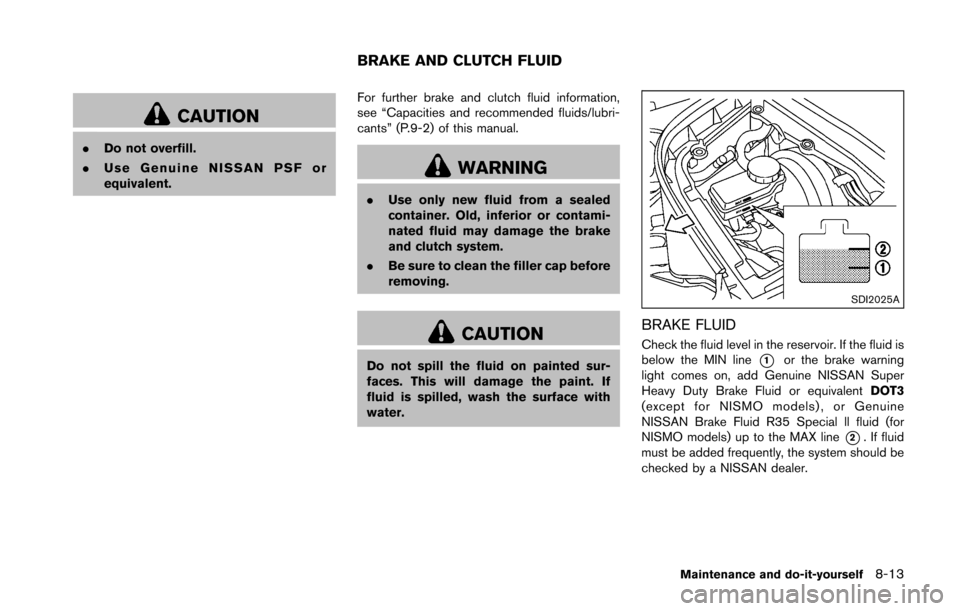
CAUTION
.Do not overfill.
. Use Genuine NISSAN PSF or
equivalent. For further brake and clutch fluid information,
see “Capacities and recommended fluids/lubri-
cants” (P.9-2) of this manual.
WARNING
.
Use only new fluid from a sealed
container. Old, inferior or contami-
nated fluid may damage the brake
and clutch system.
. Be sure to clean the filler cap before
removing.
CAUTION
Do not spill the fluid on painted sur-
faces. This will damage the paint. If
fluid is spilled, wash the surface with
water.
SDI2025A
BRAKE FLUID
Check the fluid level in the reservoir. If the fluid is
below the MIN line
*1or the brake warning
light comes on, add Genuine NISSAN Super
Heavy Duty Brake Fluid or equivalent DOT3
(except for NISMO models) , or Genuine
NISSAN Brake Fluid R35 Special ll fluid (for
NISMO models) up to the MAX line
*2. If fluid
must be added frequently, the system should be
checked by a NISSAN dealer.
Maintenance and do-it-yourself8-13
BRAKE AND CLUTCH FLUID
Page 370 of 428
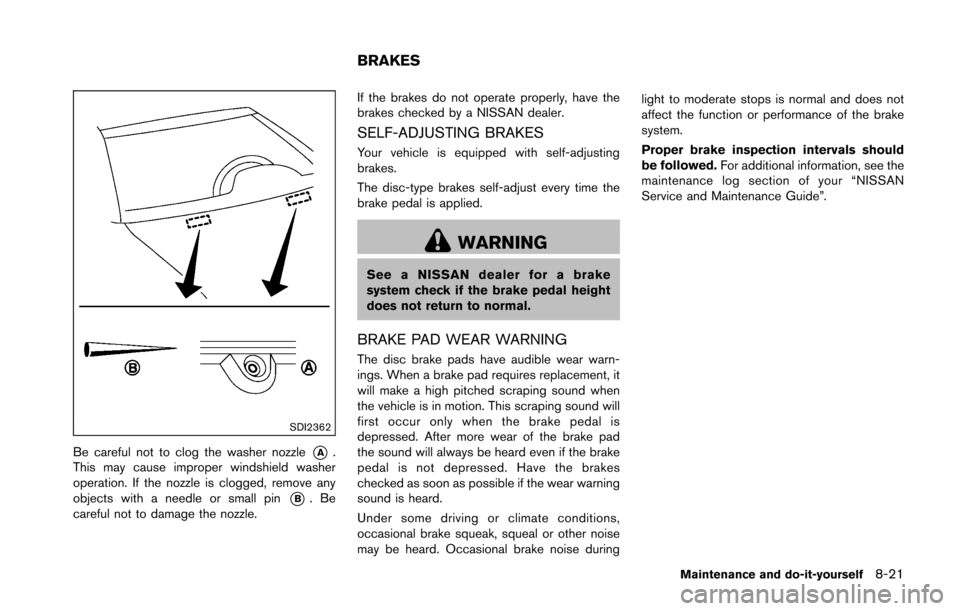
SDI2362
Be careful not to clog the washer nozzle*A.
This may cause improper windshield washer
operation. If the nozzle is clogged, remove any
objects with a needle or small pin
*B.Be
careful not to damage the nozzle. If the brakes do not operate properly, have the
brakes checked by a NISSAN dealer.
SELF-ADJUSTING BRAKES
Your vehicle is equipped with self-adjusting
brakes.
The disc-type brakes self-adjust every time the
brake pedal is applied.
WARNING
See a NISSAN dealer for a brake
system check if the brake pedal height
does not return to normal.
BRAKE PAD WEAR WARNING
The disc brake pads have audible wear warn-
ings. When a brake pad requires replacement, it
will make a high pitched scraping sound when
the vehicle is in motion. This scraping sound will
first occur only when the brake pedal is
depressed. After more wear of the brake pad
the sound will always be heard even if the brake
pedal is not depressed. Have the brakes
checked as soon as possible if the wear warning
sound is heard.
Under some driving or climate conditions,
occasional brake squeak, squeal or other noise
may be heard. Occasional brake noise duringlight to moderate stops is normal and does not
affect the function or performance of the brake
system.
Proper brake inspection intervals should
be followed.
For additional information, see the
maintenance log section of your “NISSAN
Service and Maintenance Guide”.
Maintenance and do-it-yourself8-21
BRAKES
Page 387 of 428
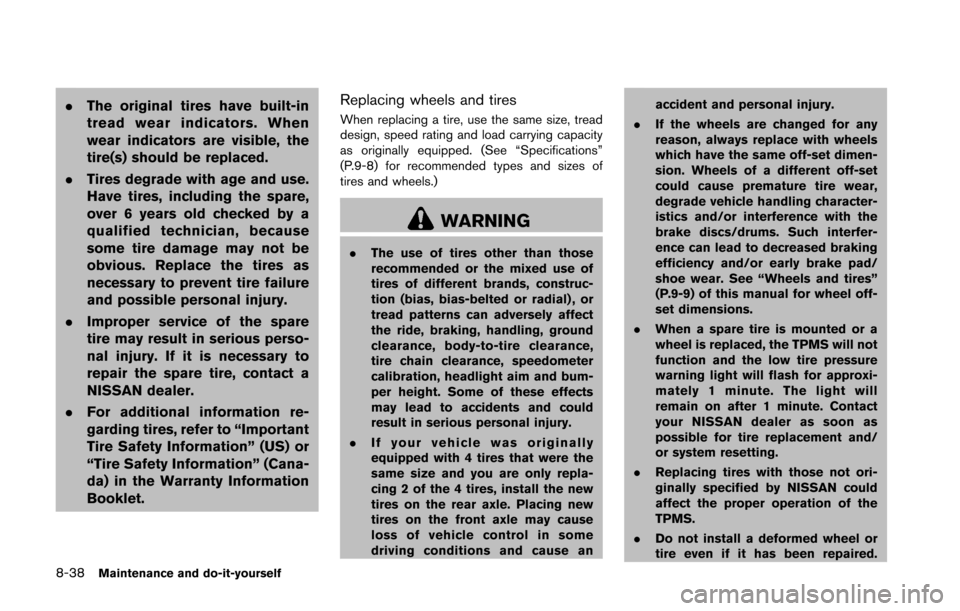
8-38Maintenance and do-it-yourself
.The original tires have built-in
tread wear indicators. When
wear indicators are visible, the
tire(s) should be replaced.
. Tires degrade with age and use.
Have tires, including the spare,
over 6 years old checked by a
qualified technician, because
some tire damage may not be
obvious. Replace the tires as
necessary to prevent tire failure
and possible personal injury.
. Improper service of the spare
tire may result in serious perso-
nal injury. If it is necessary to
repair the spare tire, contact a
NISSAN dealer.
. For additional information re-
garding tires, refer to “Important
Tire Safety Information” (US) or
“Tire Safety Information” (Cana-
da) in the Warranty Information
Booklet.Replacing wheels and tires
When replacing a tire, use the same size, tread
design, speed rating and load carrying capacity
as originally equipped. (See “Specifications”
(P.9-8) for recommended types and sizes of
tires and wheels.)
WARNING
. The use of tires other than those
recommended or the mixed use of
tires of different brands, construc-
tion (bias, bias-belted or radial) , or
tread patterns can adversely affect
the ride, braking, handling, ground
clearance, body-to-tire clearance,
tire chain clearance, speedometer
calibration, headlight aim and bum-
per height. Some of these effects
may lead to accidents and could
result in serious personal injury.
. If your vehicle was originally
equipped with 4 tires that were the
same size and you are only repla-
cing 2 of the 4 tires, install the new
tires on the rear axle. Placing new
tires on the front axle may cause
loss of vehicle control in some
driving conditions and cause an accident and personal injury.
. If the wheels are changed for any
reason, always replace with wheels
which have the same off-set dimen-
sion. Wheels of a different off-set
could cause premature tire wear,
degrade vehicle handling character-
istics and/or interference with the
brake discs/drums. Such interfer-
ence can lead to decreased braking
efficiency and/or early brake pad/
shoe wear. See “Wheels and tires”
(P.9-9) of this manual for wheel off-
set dimensions.
. When a spare tire is mounted or a
wheel is replaced, the TPMS will not
function and the low tire pressure
warning light will flash for approxi-
mately 1 minute. The light will
remain on after 1 minute. Contact
your NISSAN dealer as soon as
possible for tire replacement and/
or system resetting.
. Replacing tires with those not ori-
ginally specified by NISSAN could
affect the proper operation of the
TPMS.
. Do not install a deformed wheel or
tire even if it has been repaired.
Page 415 of 428
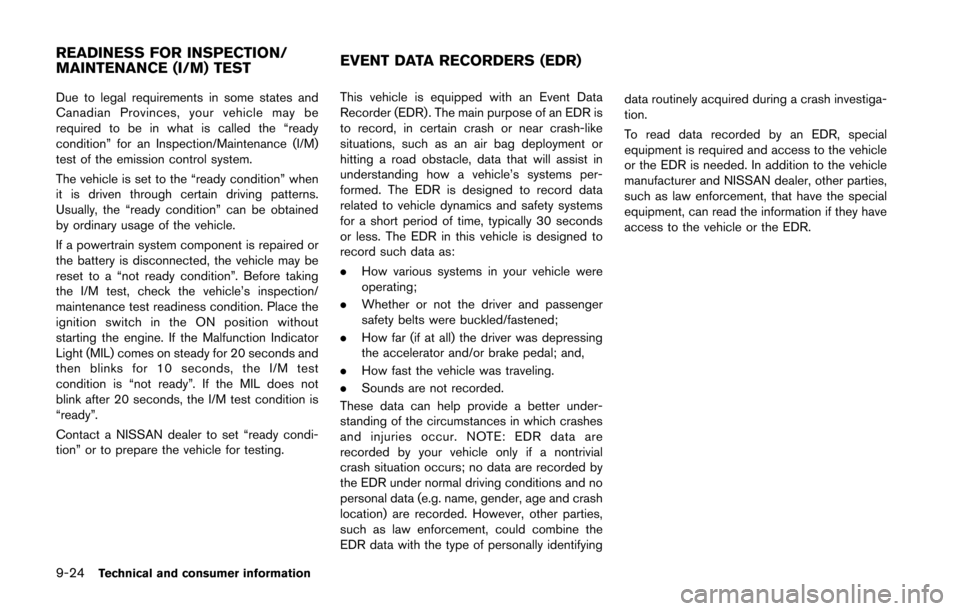
9-24Technical and consumer information
Due to legal requirements in some states and
Canadian Provinces, your vehicle may be
required to be in what is called the “ready
condition” for an Inspection/Maintenance (I/M)
test of the emission control system.
The vehicle is set to the “ready condition” when
it is driven through certain driving patterns.
Usually, the “ready condition” can be obtained
by ordinary usage of the vehicle.
If a powertrain system component is repaired or
the battery is disconnected, the vehicle may be
reset to a “not ready condition”. Before taking
the I/M test, check the vehicle’s inspection/
maintenance test readiness condition. Place the
ignition switch in the ON position without
starting the engine. If the Malfunction Indicator
Light (MIL) comes on steady for 20 seconds and
then blinks for 10 seconds, the I/M test
condition is “not ready”. If the MIL does not
blink after 20 seconds, the I/M test condition is
“ready”.
Contact a NISSAN dealer to set “ready condi-
tion” or to prepare the vehicle for testing.This vehicle is equipped with an Event Data
Recorder (EDR) . The main purpose of an EDR is
to record, in certain crash or near crash-like
situations, such as an air bag deployment or
hitting a road obstacle, data that will assist in
understanding how a vehicle’s systems per-
formed. The EDR is designed to record data
related to vehicle dynamics and safety systems
for a short period of time, typically 30 seconds
or less. The EDR in this vehicle is designed to
record such data as:
.
How various systems in your vehicle were
operating;
. Whether or not the driver and passenger
safety belts were buckled/fastened;
. How far (if at all) the driver was depressing
the accelerator and/or brake pedal; and,
. How fast the vehicle was traveling.
. Sounds are not recorded.
These data can help provide a better under-
standing of the circumstances in which crashes
and injuries occur. NOTE: EDR data are
recorded by your vehicle only if a nontrivial
crash situation occurs; no data are recorded by
the EDR under normal driving conditions and no
personal data (e.g. name, gender, age and crash
location) are recorded. However, other parties,
such as law enforcement, could combine the
EDR data with the type of personally identifying data routinely acquired during a crash investiga-
tion.
To read data recorded by an EDR, special
equipment is required and access to the vehicle
or the EDR is needed. In addition to the vehicle
manufacturer and NISSAN dealer, other parties,
such as law enforcement, that have the special
equipment, can read the information if they have
access to the vehicle or the EDR.
READINESS FOR INSPECTION/
MAINTENANCE (I/M) TEST
EVENT DATA RECORDERS (EDR)
Page 420 of 428
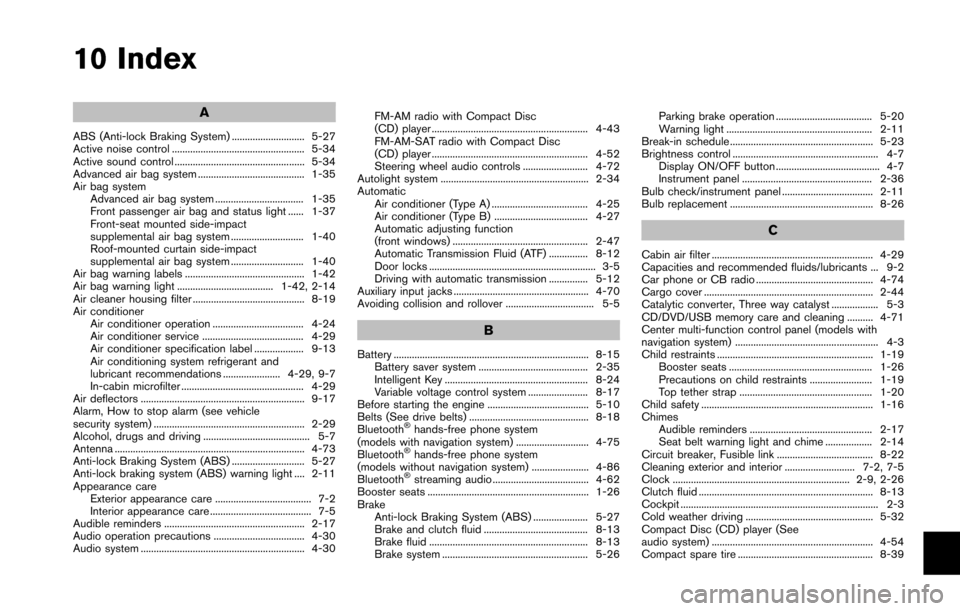
10 Index
A
ABS (Anti-lock Braking System) ............................ 5-27
Active noise control ................................................... 5-34
Active sound control .................................................. 5-34
Advanced air bag system ......................................... 1-35
Air bag systemAdvanced air bag system .................................. 1-35
Front passenger air bag and status light ...... 1-37
Front-seat mounted side-impact
supplemental air bag system ............................ 1-40
Roof-mounted curtain side-impact
supplemental air bag system ............................ 1-40
Air bag warning labels .............................................. 1-42
Air bag warning light ..................................... 1-42, 2-14
Air cleaner housing filter ........................................... 8-19
Air conditioner Air conditioner operation ................................... 4-24
Air conditioner service ....................................... 4-29
Air conditioner specification label ................... 9-13
Air conditioning system refrigerant and
lubricant recommendations ...................... 4-29, 9-7
In-cabin microfilter ............................................... 4-29
Air deflectors ............................................................... 9-17
Alarm, How to stop alarm (see vehicle
security system) .......................................................... 2-29
Alcohol, drugs and driving ......................................... 5-7
Antenna ......................................................................... 4-73
Anti-lock Braking System (ABS) ............................ 5-27
Anti-lock braking system (ABS) warning light .... 2-11
Appearance care Exterior appearance care ..................................... 7-2
Interior appearance care ....................................... 7-5
Audible reminders ...................................................... 2-17
Audio operation precautions ................................... 4-30
Audio system ............................................................... 4-30 FM-AM radio with Compact Disc
(CD) player ............................................................ 4-43
FM-AM-SAT radio with Compact Disc
(CD) player ............................................................ 4-52
Steering wheel audio controls ......................... 4-72
Autolight system ......................................................... 2-34
Automatic Air conditioner (Type A) ..................................... 4-25
Air conditioner (Type B) .................................... 4-27
Automatic adjusting function
(front windows) .................................................... 2-47
Automatic Transmission Fluid (ATF) ............... 8-12
Door locks ................................................................ 3-5
Driving with automatic transmission ............... 5-12
Auxiliary input jacks .................................................... 4-70
Avoiding collision and rollover .................................. 5-5
B
Battery ........................................................................... 8-15 Battery saver system .......................................... 2-35
Intelligent Key ....................................................... 8-24
Variable voltage control system ....................... 8-17
Before starting the engine ....................................... 5-10
Belts (See drive belts) .............................................. 8-18
Bluetooth
�Šhands-free phone system
(models with navigation system) ............................ 4-75
Bluetooth
�Šhands-free phone system
(models without navigation system) ...................... 4-86
Bluetooth
�Šstreaming audio ..................................... 4-62
Booster seats .............................................................. 1-26
Brake Anti-lock Braking System (ABS) ..................... 5-27
Brake and clutch fluid ........................................ 8-13
Brake fluid ............................................................. 8-13
Brake system ........................................................ 5-26 Parking brake operation ..................................... 5-20
Warning light ........................................................ 2-11
Break-in schedule ....................................................... 5-23
Brightness control ........................................................ 4-7 Display ON/OFF button ........................................ 4-7
Instrument panel .................................................. 2-36
Bulb check/instrument panel ................................... 2-11
Bulb replacement ....................................................... 8-26
C
Cabin air filter .............................................................. 4-29
Capacities and recommended fluids/lubricants ... 9-2
Car phone or CB radio ............................................. 4-74
Cargo cover ................................................................. 2-44
Catalytic converter, Three way catalyst .................. 5-3
CD/DVD/USB memory care and cleaning .......... 4-71
Center multi-function control panel (models with
navigation system) ....................................................... 4-3
Child restraints ............................................................ 1-19 Booster seats ....................................................... 1-26
Precautions on child restraints ........................ 1-19
Top tether strap ................................................... 1-20
Child safety .................................................................. 1-16
Chimes Audible reminders ............................................... 2-17
Seat belt warning light and chime .................. 2-14
Circuit breaker, Fusible link ..................................... 8-22
Cleaning exterior and interior ........................... 7-2, 7-5
Clock .................................................................... 2-9, 2-26
Clutch fluid ................................................................... 8-13
Cockpit ............................................................................ 2-3
Cold weather driving ................................................. 5-32
Compact Disc (CD) player (See
audio system) .............................................................. 4-54
Compact spare tire .................................................... 8-39
Page 421 of 428
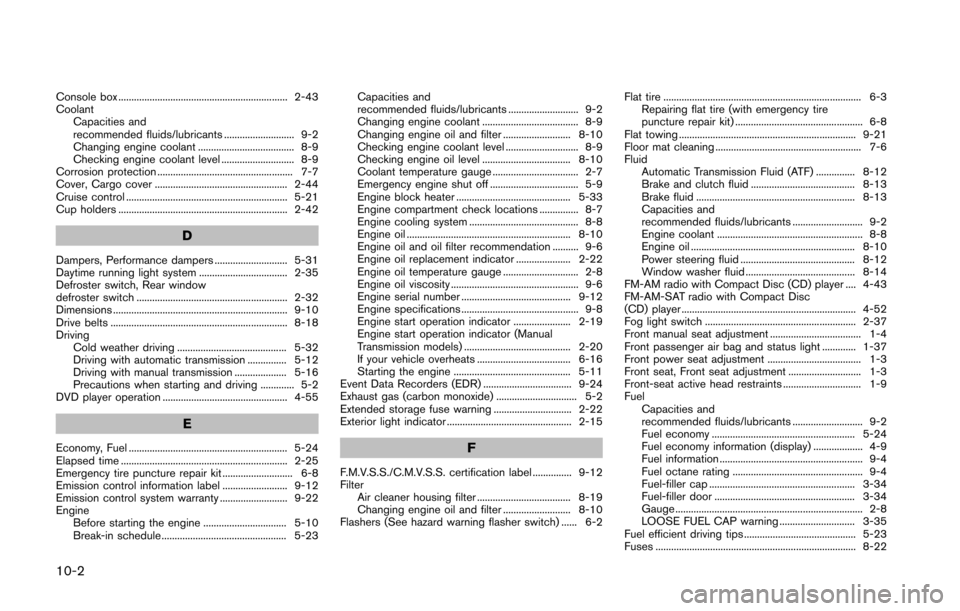
10-2
Console box ................................................................. 2-43
CoolantCapacities and
recommended fluids/lubricants ........................... 9-2
Changing engine coolant ..................................... 8-9
Checking engine coolant level ............................ 8-9
Corrosion protection .................................................... 7-7
Cover, Cargo cover ................................................... 2-44
Cruise control .............................................................. 5-21
Cup holders ................................................................. 2-42
D
Dampers, Performance dampers ............................ 5-31
Daytime running light system .................................. 2-35
Defroster switch, Rear window
defroster switch .......................................................... 2-32
Dimensions ................................................................... 9-10
Drive belts .................................................................... 8-18
Driving Cold weather driving .......................................... 5-32
Driving with automatic transmission ............... 5-12
Driving with manual transmission .................... 5-16
Precautions when starting and driving ............. 5-2
DVD player operation ................................................ 4-55
E
Economy, Fuel ............................................................. 5-24
Elapsed time ................................................................ 2-25
Emergency tire puncture repair kit ........................... 6-8
Emission control information label ......................... 9-12
Emission control system warranty .......................... 9-22
Engine Before starting the engine ................................ 5-10
Break-in schedule ................................................ 5-23 Capacities and
recommended fluids/lubricants ........................... 9-2
Changing engine coolant ..................................... 8-9
Changing engine oil and filter .......................... 8-10
Checking engine coolant level ............................ 8-9
Checking engine oil level .................................. 8-10
Coolant temperature gauge ................................. 2-7
Emergency engine shut off .................................. 5-9
Engine block heater ............................................ 5-33
Engine compartment check locations ............... 8-7
Engine cooling system .......................................... 8-8
Engine oil ............................................................... 8-10
Engine oil and oil filter recommendation .......... 9-6
Engine oil replacement indicator ..................... 2-22
Engine oil temperature gauge ............................. 2-8
Engine oil viscosity ................................................. 9-6
Engine serial number .......................................... 9-12
Engine specifications ............................................. 9-8
Engine start operation indicator ...................... 2-19
Engine start operation indicator (Manual
Transmission models) ......................................... 2-20
If your vehicle overheats .................................... 6-16
Starting the engine ............................................. 5-11
Event Data Recorders (EDR) .................................. 9-24
Exhaust gas (carbon monoxide) ............................... 5-2
Extended storage fuse warning .............................. 2-22
Exterior light indicator ................................................ 2-15F
F.M.V.S.S./C.M.V.S.S. certification label ............... 9-12
Filter Air cleaner housing filter .................................... 8-19
Changing engine oil and filter .......................... 8-10
Flashers (See hazard warning flasher switch) ...... 6-2 Flat tire ............................................................................ 6-3
Repairing flat tire (with emergency tire
puncture repair kit) ................................................. 6-8
Flat towing .................................................................... 9-21
Floor mat cleaning ........................................................ 7-6
Fluid Automatic Transmission Fluid (ATF) ............... 8-12
Brake and clutch fluid ........................................ 8-13
Brake fluid ............................................................. 8-13
Capacities and
recommended fluids/lubricants ........................... 9-2
Engine coolant ........................................................ 8-8
Engine oil ............................................................... 8-10
Power steering fluid ............................................ 8-12
Window washer fluid .......................................... 8-14
FM-AM radio with Compact Disc (CD) player .... 4-43
FM-AM-SAT radio with Compact Disc
(CD) player ................................................................... 4-52
Fog light switch .......................................................... 2-37
Front manual seat adjustment ................................... 1-4
Front passenger air bag and status light ............. 1-37
Front power seat adjustment .................................... 1-3
Front seat, Front seat adjustment ............................ 1-3
Front-seat active head restraints .............................. 1-9
Fuel Capacities and
recommended fluids/lubricants ........................... 9-2
Fuel economy ....................................................... 5-24
Fuel economy information (display) ................... 4-9
Fuel information ....................................................... 9-4
Fuel octane rating .................................................. 9-4
Fuel-filler cap ........................................................ 3-34
Fuel-filler door ...................................................... 3-34
Gauge ........................................................................ 2-8
LOOSE FUEL CAP warning ............................. 3-35
Fuel efficient driving tips ........................................... 5-23
Fuses ............................................................................. 8-22